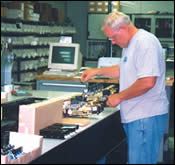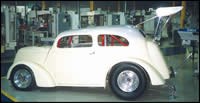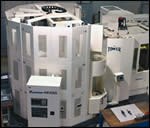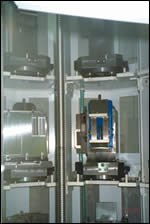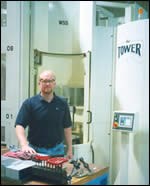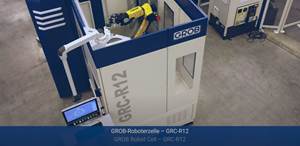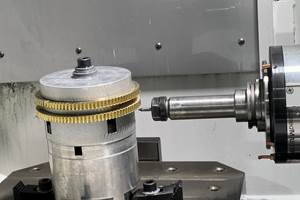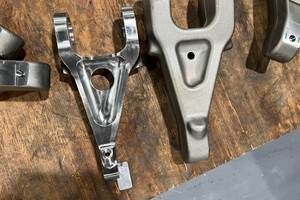Planning For On-Demand Machining
Quick turnaround on repeat jobs is a competitive advantage for this shop. Making rapid response a reality requires planning and commitment from all areas of the business as well as close communication with customers and suppliers.
Share





In a perfect machine shop world, when an order for parts comes in, the job is already fixtured, tools are already in the machine, programs are a keystroke or two away, material is on hand and chips are being cut within minutes of hanging up the phone. That vision describes how Schultes Precision Machining (Buffalo Grove, Illinois) approaches the machine shop work assigned to its horizontal machining center cell.
Founded in 1946, this family-owned business has survived and prospered by adapting its manufacturing methods to the needs of its customer base. Like many machine shops, SPM has evolved from its short run and prototype roots to include more value-added services.
"We think of our company as more than a job shop," says third-generation family member Ryan Schultes. "We do a number of added processes that most job shops don't do. For example, we do subassembly work and, in some cases, complete assemblies that are dock to stock or line-ready drop shipments of complete products to a customer's plant."
True JIT
Several of SPM's larger customers are on a true just-in-time inventory system. Typically, these customers use blanket orders for the work they need done.
According to Mr. Schultes, an example of how these blankets work is that a customer orders 1,000 parts for, let's say, a year. Each week, the customer orders lots from the blanket - one week, it needs two parts; the next week, 50 parts; the following week, no parts. Obviously, a shop has to be fairly nimble to respond to such a scheduling nightmare.
Moreover, because these JIT customers are generally the ones for which SPM provides line-ready components, turnaround time in the machining side of the shop is even more critical because it impacts the rest of the shop. "It was the needs of our customers that drove us to look very hard at setup reduction for repeat jobs within the shop," recalls Mr. Schultes. "We try to be an extension of these customers' plants, so meeting their schedules is the priority."
Saving Setup Time
Eliminating setups on key repeat jobs would reduce both leadtime and cost, but it would require a different way of looking at how the shop tooled, fixtured and produced its work. The challenge is to create a way to realistically perform on-demand machining.
For many shops, the simple solution to deal with scheduling requirements like those faced by SPM was faced is to run larger than needed lots and then hold the overage in inventory for quick delivery response. That method wouldn't work for SPM.
"A single, critical customer directed us to look at palletizing for setup," says Mr. Schultes. "It is a medical equipment manufacturer, and we supply assembled components for its machines. That requires us to run kits of parts for use in our assembly department. There may be ten pieces per kit. That's too much inventory to keep track of or have lying around." What SPM envisioned was finding a way to have all of this customer's jobs tooled and ready to be machined at a moment's notice.
The answer came in the form of a Kitamura HX-400 "Tower" with 21 pallets available for 150 tools. For SPM, the vertically oriented triple tier pallet storage configuration of the tower was ideal because of the shop's limited floor space.
Each of the 21 pallets uses a tombstone for attaching fixtures and clamps, which effectively gives SPM storage capacity for 84 discrete parts if necessary. "A large advantage that we've derived from this machining center system is simplification of our material handling needs," says Mr. Schultes. "Most of the parts we run on this cell are various brackets, bearing blocks and other components for our medical machine customer. Because we make them in ship sets, automation for load/unload isn't practical. However, with 21 pallets fixtured and available as needed, we can run attended or unattended, even over a weekend as necessary."
Rationalizing Jobs
The customer's components currently resident in the machine pallet storage tower go into making several different products that this customer sells. Some part sets may only have a blanket order for ten sets per year, while another may require 1,000 sets.
In total, SPM machines 1,000 different parts for this particular customer. Obviously, not all of the parts can be held pre-set in the pallet storage tower. Picking the right jobs is critical to successful operation of the cell.
"Complexity of the setup is one of the factors we look at when deciding which parts should be kept ready in the tower," says Mr. Schultes. "For example, we may only have a annual blanket order for ten sets of a given component, but because the parts are complex and take a significant amount of time to set up, we can keep them pre-set in pallet storage. If you can set up a job in an hour, for example, it's not efficient to take up a pallet in the cell. But jobs with a 6 to 8 hour setup get a serious look for keeping ready to run. The savings in setup time, even for short runs, is enough to justify keeping those and similar parts ready to go."
Frequency of repeat is another consideration. Some of the parts don't have a solid forecast but meet the setup criteria. Scheduling these on a conventional machining center is difficult because of the unknown quantity. "A customer may tell us it wants 200 parts over a year but can't give us a reasonable production forecast," says Mr. Schultes. "This on-demand concept is ideal for those short leadtime orders."
Because running the cell lights-out is important to its efficiency and cost savings, only aluminum and plastic materials are currently machined. Chip control, tooling optimization and cutter life, as well as coolant formulation, are issues that lights-out cellular machining has to take into consideration. "Trying to introduce steel or other materials into the manufacturing mix takes different tooling and more monitoring," says Mr. Schultes.
Some Economics
Most shops invest in capital equipment because they need additional capacity or they are trying to lower costs using automation. With the application of this machining cell and a second eight-pallet Kitmura cell that's being installed, SPM has managed to add capacity and lower its costs. In addition to cells, the on-demand concept of reduced setup was applied wherever possible in the rest of the shop's machine tools.
"Reducing setup allows our most senior and experienced people - usually the setup people - to do other work," says Mr. Schultes. "In effect, the use of the pre-set palletized machining system has expanded the useful capacity of the shop without expanding the labor pool. Going to this new system, it's not our goal to eliminate our setup people, but rather to eliminate setup. Success in this has allowed us to lower our manufacturing costs and better use our people, [having them do] work they find more interesting."
Working With Vendors
Implementing rapid response machining transcends the immediate shop floor. In SPM's case, its machining operations must work with the assembly departments to get them what they need, when they need it to hit the JIT delivery schedules. Likewise, the vendors that the machine shop must rely on to supply materials and tooling must also be brought into the rapid response loop.
SPM suppliers must also be part of a true JIT system. "My material supplier can't demand that I take 100 blanks in a week when the customer order is for 50," says Mr. Schultes. "We negotiate with the vendor so the system flows smoothly. For tooling, we turned the shop over to a single vendor who inventories, stocks and maintains our tool stores."
Good Work Begets More Work
The on-demand machining system that SPM uses has worked well to reduce the costs associated with setup. The 21-pallet Kitamura cell and the newer eight-pallet cell have proven the concept for this shop. The shop has also proven the concept for many of its customers, who have increased the work they put through this shop.
Related Content
Grob Robot Cell Enables Long Periods of Unmanned Operation
The GRC-R12 robot cell features a pneumatic single- or double-gripper system, as well as a drawer feed system with six drawers.
Read MoreKitamura Five-Axis Machining Cell Enables Unmanned Operation
IMTS 2024: Kitamura Machinery showcases the Supercell-300G five-axis, horizontal machining cell designed for compact machining and a pallet pool system, along with other CNC automation systems.
Read MoreFour-Axis Horizontal Machining Doubles Shop’s Productivity
Horizontal four-axis machining enabled McKenzie CNC to cut operations and cycle times for its high-mix, high-repeat work — more than doubling its throughput.
Read MoreHorizontal High-Speed Machining Saves Hundreds of Work Hours
High-speed machining is the latest change at Blair-HSM South, helping this once old-fashioned shop improve productivity and morale while enabling new work.
Read MoreRead Next
Setting Up the Building Blocks for a Digital Factory
Woodward Inc. spent over a year developing an API to connect machines to its digital factory. Caron Engineering’s MiConnect has cut most of this process while also granting the shop greater access to machine information.
Read MoreBuilding Out a Foundation for Student Machinists
Autodesk and Haas have teamed up to produce an introductory course for students that covers the basics of CAD, CAM and CNC while providing them with a portfolio part.
Read More5 Rules of Thumb for Buying CNC Machine Tools
Use these tips to carefully plan your machine tool purchases and to avoid regretting your decision later.
Read More












